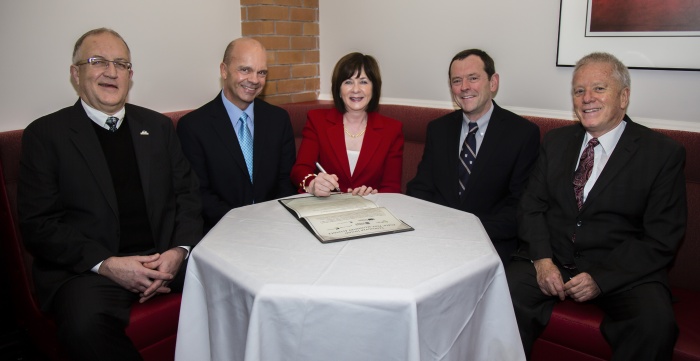Camosun College president Kathryn Laurin recently signed an agreement with four other postsecondary institutions (the University of Victoria, Royal Roads University, North Island College, and Vancouver Island University), creating the Vancouver Island Public Post-Secondary Alliance.
The new alliance of schools say they are committed to working together to stimulate economic and social initiatives to benefit both students and the island community at large.

“The institutes, for many, many years, have worked quite closely together on a number of fronts,” says Joan Yates, Camosun’s vice president communications. “This is just formalizing it a little bit more. Giving formal structure to what has, in the past, been done informally. “
The schools plan on reaching agreements on multiple issues, hoping to increase the accessibility of postsecondary education to all students.
“We are looking at ways to maximize resources,” says Yates. “But I think more importantly, we are looking at ways to maximize opportunities for learners. That includes things like defining pathways more clearly, and having memorandums of understandings for students that are transferring from program to program, so that it becomes more seamless and clearer to the learner. Less red tape, more enabling.”
Another topic the alliance will be discussing is how to respond to forces on the economic development front.
To do this, the schools plan to collectively develop programs and to enter relationships with industry together.
“Co-op work education would be a classic example,” says Yates. “We currently have a very good working relationship with UVic, but part of what we may be looking at here is finding ways students can work in other jurisdictions more easily, and conversely look at how we might collectively provide programming to all the learners on Vancouver Island.”
The Camosun College Student Society (CCSS) says it is in favor of the schools on the island working together, instead of in competition with each other.
“We have seen institutions using tuition revenue and public funding on advertising meant to take students from one postsecondary institution to another,” says CCSS external executive Simka Marshall. “What we want to see is institutions working more effectively together to better serve our communities and to result in savings that can then be used to increase services for students.”
Yates says that the alliance would be open to having a dialogue with the CCSS to ensure that the needs of Camosun students are being met.
“The student society has identified some really interesting elements that I don’t think have been considered, but not to say that it couldn’t be a very interesting conversation about how we economize,” says Yates. ”But I think the big win for students is really going to be what comes of us continuing to streamline pathways, just making it easier.”
